In which the beleaguered reviewer attempts to make some headway into the mounds of CDs seeking reviews accumulating daily by providing quick hits on a few recordings at a time.
 Charles Lloyd - "Mirror"
Charles Lloyd - "Mirror"
(ECM)
Veteran saxophonist Lloyd's last album was a live outing with his "New Quartet" - pianist Jason Moran, bassist Ruben Rogers and drummer Eric Harland. Rabo de Nube was warmly received - winning the #1 album of the year in both the readers and the critics polls for Jazz Times Magazine. Mirror is his follow up and offers the same lineup in a studio setting, and don't be surprised if this album matches the acclaim given its predecessor. The 72-year-old Lloyd is playing with a glorious tone and sensitive feel garnered through a lifetime of experience. The music consists of a mixture of originals, one standard (a truly gorgeous "I Fall in Love too Easily") , three traditionals ("Go Down Moses," "La Llorona" and "The Water is Wide"), "Lift Every Voice and Sing" (aka the African American National Anthem), two incredible Monk covers ("Monk''s Mood" and "Ruby, My Dear") and even Brian Wilson's luminous "Caroline, No" (not too surprising, since Lloyd toured for many years with the Beach Boys). What is surprising is the beautiful mellow and open approach Lloyd brings to these songs - allowing his young band space to explore new directions while bringing a fresh new outlook to the songs. Lloyd's graceful tenor shines throughout - guiding the way, and he also brings out his sweet alto - a rare but welcome occurrence. Moran seems to truly be coming into his own as one of the brightest young jazz artists of his generation - with fabulous work on Lost on a Dream with Paul Motian and Chris Potter (see our review here) and his fine new album Ten (see below). Perhaps the closest descendant to the great Monk, Moran's promise as an artist has really come together this year. Meanwhile, the much-in-demand Harland and Rogers pair up as rhythm section of immense taste and creativity. The compositions are free in varying degrees and often take off down unexpected paths, but the interplay between these fine players is wondrous. Lloyd even ends things with a shimmering spoken word piece - "Tagi" that sends the listener off into deep contemplation. Brilliant in conception and performance, and an album I simply can't stop listening to.
www.charleslloyd.com/
Dave Holland Octet - "Pathways"
 (Dare2)
(Dare2)
Is there a more prolific and consistent band leader alive today than Dave Holland? With a core quintet in place and members of a large ensemble he can call on, Holland this time out opts to stake a middle ground with an octet - adding alto sax and flute player Antonio Hart, trumpeter Alex Sipiagin and baritone saxophonist Gary Smulyan from his big band to his usual extremely talented group (the marvelous Chris Potter on tenor and soprano sax, Steve Nelson on vibes and marimba, Nate Smith on drums and Robin Eubanks on trombone). Most of the previous material has been previously recorded in completely different contexts, but with the agility of the quintet combined with the added heft of the additional horns, Holland and crew are able to negotiate some exciting new directions with old material, while adding a couple new entries as well. Some may say the band leader has hit upon a bit of formula in his writing/arranging, but when the results are so strong, it seems ludicrous to complain about what has become his signature style. The 64-year-old Holland shows no signs of slowing down. (I just caught him live at the Jazz Showcase and he looks fit as a bass fiddle - see our review and photos here) In fact he offers some juicy solos as well as admirably attending to his duties anchoring of the band. One of the new numbers - the Holland-penned Latin burner title track opens things with a bang and an aggressive Smulyan bari solo, followed by Holland himself soloing over Nelson's comping vibes, before Sipiagin kicks into high gear on a trumpet solo. Next the leader takes a great solo before the band launches into the heavy groove of "How's Never?" - on which Antonio Hart is unleashed. Not to be left out, Nate Smith adds a fine drum solo as well. Potter's "Sea of Marmara" slows things down, while giving him an opportunity to wail on his soprano. Nelson, meanwhile takes a more paced approach to his shimmering solo. Holland's charts hint at Gil Evans here as well. The arrangement is again noteworthy on the Latin-flavored "Ebb and Flow" - on which Eubanks shines on his showcase, and Potter rips it up on his tenor. "Blue Jean" is a nice bluesy change of pace, while Sipiagin's "Wind Dance" features swirling horns and Potter on flute. Album ender - the 15:04 "Shadow Dance" - gives nearly everyone an opportunity to get into the act and is a textbook example of the Holland approach - gather excellent players, write some tasty charts for them and then let them show their stuff. Sounds simple enough, but is rarely ever done as effectively as the British-born bassist has.
www.daveholland.com/
 Jason Moran & The Bandwagon - "Ten"
Jason Moran & The Bandwagon - "Ten"
(Blue Note)
A decade into his groundbreaking work with his Bandwagon trio and young piano star Jason Moran is really hitting his stride. Of course that comment is tongue-in-cheek, because as this artist continually pushes the music forward, he always keeps one eye on the great traditions of the past - like stride piano style - as well. Case in point - the opening track "Blue Blocks" combines gospel-inflected lines with avant garde piano directions and a hard-charging rhythm section comprised of his usual Bandwagon mates - bassist Taurus Mateen and Drummer Nasheet Waits. Moran deconstructs the gospel sound delightfully, but he's just getting started. "RFK in the Land of Apartheid" comes from a film soundtrack he scored, and is a moving commemoration of Senator Kennedy's famous "Ripple of Hope" speech at the University of Cape Town. "Feedback Pt. 2" was composed for the Monterey Jazz Festival and uses a looped electronic sample of Jimi Hendrix's guitar from the 1967 Monterey Pop Fest as atmosphere. One of Moran's primary forebears - Thelonious Monk is saluted on an engaging version of "Crepuscule With Nellie." Nor is Monk the only influence Moran pays tribute to --the late Andrew Hill cowrote the excellent "Play to Live" and he also covers former teacher Jaki Byard's swinging "To Bob Vatel of Paris." Perhaps more surprisingly, he also references Leonard Bernstein ("Big Stuff") and relatively unknown composer Conlon Nancarrow (two different versions of "Study No. 6" - at completely different tempos - something Nancarrow would have appreciated). A piece written for a ballet and an exuberant "Gangster" series entry ("Gangsterism Over 10 Years") mix the modern with the traditional in the Moran manner, while the unique artist also offers a hidden track - "Nobody" by the turn-of-the century vaudevillian Bert Williams at the end of the recording. Always exciting and inventive, Moran's work here - along with on Charles Lloyd's Mirror and with Paul Motian and Chris Potter on Lost in Dream make it clear that he is the most exciting pianist working in jazz today. Here's to many decades more!
www.jasonmoran.com/
Open Combo - "Large"
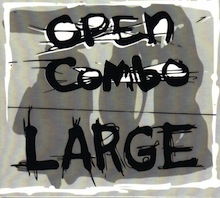 (Fonterossa)
(Fonterossa)
One of the great things about attending the Chicago Jazz Fest is that it often serves as an introduction to musicians from around the world who we Americans - in our cultural myopia - tend not to deign to be aware of. While this year's budget-compromised version didn't offer the usual high-profile acts from across the globe, Tomeka Reid's Here In Now Trio's wondrous concert in the Preston Bradley Hall at the Cultural Center did feature young Italian bassist Silvia Bolognesi. Although Reid's trio does not yet have a recording (soon please!), Bolognesi's 2010 release with her Open Combo - Large is a stunning example of Bolognesi's writing, playing and bandleading talents. Bolognesi has expanded her group this time out - featuring a core group of bass, drums, trombone, saxophones and percussion surrounded by other performers on various saxes, flutes, clarinets and trumpet. to form an 11-piece ensemble. This "open-ness" opens up a wide range of sounds and colors that is centered by Bolognesi's vibrant yet substantial bass tones. "Ernst" pounces out of the speakers to start things off with repeated horn fanfare over Bolognesi's powerful walking bass and Andrea Melani's drums. Ian Da Preda's vibes provide the chords while Tony Cattano on trombone and Piero Bittolo Bon on alto take the solos - the latter during a sudden shift to a slower tempo. Exciting music with interesting changes abounding, Bolognesi wields her band like a painter with a brush. Of the 15 tracks, she has written all but four, three of which are short interludes provided by band members. The result is a cohesive whole that displays Bolognesi's surprisingly mature writing that combines traditional with a modern AACM-inspired avant garde flavor in a truly appealing manner. Compositions such as the sultry "Bottoni per Oboli" and powerhouse "Ansiosa" (with great solos by Christiano Arcelli and Da Preda) set the stage for the remainder of this bewitching recording. Bolognesi finally takes a solo on the shimmering "Letto Grosso" and her spotlight turn is well worth the wait. The centerpiece of the album - the 9:38 "B.S. 4 II B.S." starts off with a Melani drum solo before emerging as a swinging big band number Count Basie would be proud of - with nice solos from Rossano on bari sax and Luca Marianini on trumpet. "Dima" is built around a repeated 9/4 pattern on the vibes, with lush horn harmonies and gnarly solo work from Dimitri Grechi Espinoza, while Cattano's "Molto Rumore Per Nulla" is vibrant with rumbling bass below. "NOT the Ghost Trombone" lives up to its name as a haunting ballad with Cattano's trombone taking the lead and percussionist Simone Padovani adding to the atmosphere. The hard-charging "What Was I Saying" (one of several songs that have appeared in different versions on previous releases) is here presented in a more energetic manner with Arcelli, Espinoza and Emili all taking incendiary solos and is one of the most satisfying tracks, as is the percussion driven "BuuaaH!" It is clear that some of the best ensemble composers these days are women - see Carla Bley and Maria Schneider - now add this young Italian to the mix. Wake up and open your ears to what is going on elsewhere in the world, America - this isn't only a great album from a brilliant young composer, but one of the best large ensemble albums of the year.
www.myspace.com/silviabolognesi
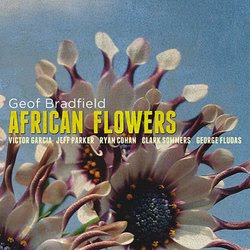 Geof Bradfield - "African Flowers"
Geof Bradfield - "African Flowers"
(Origin)
Reed player Geof Bradfield's U.S. State Dept. sponsored trip across Africa in 2008 affected him greatly and resulted in his writing the music for his new album African Flowers based on his experiences. We covered his concert presenting this music at the Chicago Cultural Center last October (see our review and photos from that event here ) and were struck at the time at how the trip to the African continent had pushed Bradfield's writing into new and especially rewarding directions. Bradfield thankfully doesn't try to simply recreate African music, but rather uses the sounds and people he encountered as inspiration for his original jazz oriented compositions. Native musical styles from Uganda, Rwanda and the Congo are fused with Bradfield's own personal vision and performed by a talented combo consisting of Bradfield, trumpeter Victor Garcia, guitarist Jeff Parker, pianist Ryan Cohan, bassist Clark Sommers and drummer George Fludas. Album opener "Butare" immediately sets the tone of the recording, starting our musical journey with a sense of wonder and a sparkling Bradfield soprano solo over Fludas' impressive drumming. Cohan also adds a pleasing solo here before taking a solo piano turn that leads into Bradfield's most haunting composition - "The Children's Room" - a sadly meditative ballad inspired by a visit to the Kigali Genocide Memorial Center with a room dedicated to the child victims of genocide. Garcia's muted horn and Bradfield's bass clarinet set a mournful tone, to which Sommers and Cohan add thoughtful solos. Bradfield paints with sounds and textures as colorful as the flowers and culture of Africa and listeners will truly enjoy songs like the rumba-based "Lubumbashi" - with great tenor work from the talented bandleader, a sizzling trumpet solo by Garcia and Parker and Cohan emulating mbiras on their instruments. The lovely "Mama Yemo," skittering "Nairobi Transit," polyrhythmic "Kampala" and vaguely unsettling "The Nurse from Nairobi" all are compositions of depth and complexity - which show how much Bradfield has grown as a composer since his fine Urban Nomad release - and these pieces are bridged by well-played drum, bass and guitar interludes. Meanwhile, the album mix throughout captures the bright, clean sound well. "Harare/Leaving Africa" is a 10:34 opus that recalls Randy Weston and ends the album on a true high, with Fludas on fire and some of Garcia's best work on record. Mature and exciting work from an ascendant player and composer.
www.geofbradfield.com/
Bill Frisell - "Beautiful Dreamers"
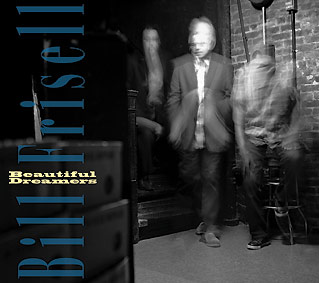 (Savoy Jazz)
(Savoy Jazz)
Bill Frisell - Beautiful Dreamers (Savoy Jazz) Guitarist Bill Frisell my have changed labels (moving to Savoy from Nonesuch after 20 years), but he hasn't changed his focus and is still exploring the space between jazz, folk, blues, country and rock. This time out, he is joined by viola player Eyvind Kang and drummer Rudy Royston, and the trio performs an entertaining mix of blues ("It's Nobody's Fault But My Own," "Worried Woman"), country ("Keep on the Sunny Side"), Stephen Foster's title track, "Tea for Two," Benny Goodman's "Benny's Bugle" the '60s pop hit "Goin' Out of My Head," as well as several engaging originals, including the avant garde blues of "Winslow Homer" and the pop-ish "Better Than a Machine (for Vic Chesnutt)" - that almost sounds like Devo gone acoustic. Most of the tracks are played with Frisell's usual quirky approach - so if you are a fan (like I am) - you will find much to enjoy. While "Beautiful Dreamer" starts off unrecognizable, "Tea for Two" is played pretty straight, and the dusty old antique regains its charm for a new generation. Meanwhile, Kang and Royston bring their own personalities to the project giving it a nice balance of sounds - especially with Kang moving easily between pizzicato, bowed scrapings and silken strings. Without a doubt the jazz artist the most willing to work with all aspects of American song, Bill Frisell just continues to find ways to mine gold from disparate veins.
www.billfrisell.com/
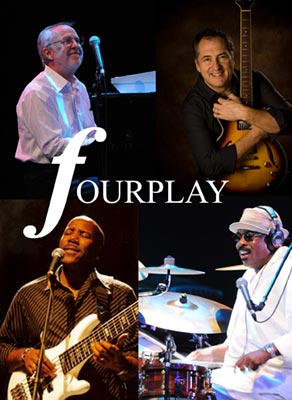 Fourplay - "Let's Touch the Sky"
Fourplay - "Let's Touch the Sky"
(Heads Up)
The group Fourplay has been together twenty years with keyboardist Bob James, drummer Harvey Mason and bassist Nathan East remaining constant. Original member - guitarist Lee Ritenour left in the mid-'90s and was replaced by Larry Carlton, who spent 12 years in the band, but recently left to work on his solo career. New guitarist Chuck Loeb makes his debut here and seems an excellent fit. Starting with James' simmering Latin-flavored title track, Loeb shows a nice touch trading licks on acoustic guitar with the pianist - whose playing is as tasteful as ever. Loeb's influence is felt even more on his "3rd Degree" (referencing his status as the 3rd guitarist to have been included in the lineup) - a groovin' burner with East's funky bass keeping the lowdown and Loeb showing some fleet fingers on electric. I suspect this may be the contemporary radio hit single the band is looking for. Mason adds the lovely "More Than a Dream" - with James on sensitive piano, East on fretless bass and Loeb stroking some delightful nylon-string guitar, and the addictive "Pineapple Getaway" (another potential hit) - which will have you longing hard for the island life. East takes a vocal turn on his pop "I'll Still Be Lovin' You" and yes, it's another catchy radio-ready track. James pays tribute to the late Hank Jones with "Gentle Giant" - a relaxed, but swinging number, and East gets mysterious on "A Night in Rio." The bassist also shines on the funky Teddy Pendergrass song "Love TKO" on which Ruben Studdard provides some velvety vocals. Loeb's breezy "Above and Beyond" is another highlight - and one can see why he was the choice to join the band. It will be interesting to see how his presence affects the group direction in the years to come. James again pulls the group back toward the more straight ahead jazz sound on the subtle "Golden Faders," while the album concludes with Anita Baker joining the band on an evocative arrangement the oft-covered "You're My Thrill." This release points the way regarding some new directions with new band member Loeb, but longtime fans will be pleased that the high quality of the band's work continues.
www.fourplayjazz.com/
Alex Sipiagin - "Generations - Dedicated to Woody Shaw"
 (Criss Cross)
(Criss Cross)
Trumpeter Woody Shaw's untimely death at age 44 (he was struck by a subway car and later died from complications) cut short a career that was filled with enormous promise, but Shaw did leave a considerable body of work. From his sideman work with Eric Dolphy, Andrew Hill, Larry Young, Chick Corea, Jackie McLean, Horace Silver, Joe Henderson and many more to a dozen or so recordings to a leader, Shaw's legacy as a composer and a player who is considered by many to be among the very best ever, continues to ascend. Shaw also was a world traveler and educator of note, whose pupils included Wynton Marsalis, Wallace Roney and Terence Blanchard. Add Russian-born trumpeter Alex Sipiagin to the list of musicians influenced by Shaw. Sipiagin is considered to be one of the top trumpet players in the world today, and is well known for his work with the Mingus Big Band, Dave Holland and his multiple albums as a leader. He calls Shaw his "favorite trumpet player" and someone who inspired him from the time when he first discovered the veteran's work in the '80s in Russia. Despite Sipiagin's tremendous technique, he doesn't attempt to duplicate Shaw's work - which ranged from hard bop and post bop to modal and avant garde. Instead, he has written a number of new pieces influenced by Shaw, while also rearranging some of Shaw's compositions and one by Larry Young (with whom Shaw recorded). Fellow Russian emigre (and Mingus band member) Boris Koslov handles the bass duties here, while Antonio Sanchez (with whom both Russians served in Michael Brecker's outfit) is on the drums. These two much-in-demand players are joined by Chris Potter Underground (and fellow Mingus alum) guitarist Adam Rogers. The performances - especially Sipiagin's highly polished fast runs and impressive technique - are as top-notch as to be expected and the songs strong. Rogers at times overdubs a second guitar part doubling the melody line along with the trumpet, which especially gives the tracks a different feel and sound than the originals. Sipiagin uses a snippet of melody from a different Shaw tune to construct his original "Greenwood," (included in two versions) while making his own interpretations of Shaw tunes like "Beyond All Limits" (from Young's Unity album. and "Obsequious" and "Cassandranite" (from Young's Cassaandrite album) and even changes the waltzing "Katerina Ballerina" (from Shaw's United) into 5/4 (it still waltzes!). Besides being a solid album of interesting new compositions and uniqu arrangements, for those not familiar with Shaw's work, these excellent tunes should give you the impetus to delve into Shaw's work - so Sipiagin has clearly scored on a couple goals with this recording.
www.alexsipiagin.com/
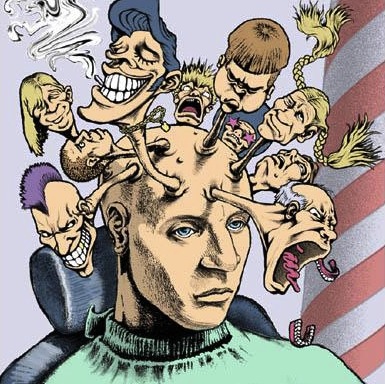 Kurt Schweitz Drexel Project - "Multivalent"
Kurt Schweitz Drexel Project - "Multivalent"
As anyone who has seen bassist Kurt Schweitz in action live as a side man around town will attest, Schweitz is one of the best young players on the scene. Don't let the baby face fool you, this cat is a monster on the bass. Now with the release of the excellent Mulitvalent - his first album as a leader - his additional talents as a composer and band leader are made quite apparent. Schweitz' talented Drexel project ensemble consists of hard-hitting drummer Andre Beasley, talented keyboardist Rob Clearfield - who brings a plethora of unique keyboard sounds to the table, and the extremely underrated saxophonist Phil Doyle. This combination is extremely effective on this short (five tracks) recording - which Schweitz says was put together in one session. It must have been a good day because the energy level and performances are of a very high level indeed. The humorously-titled opening track - "Going to Walgreens" - leaps into a bass-driven groove, but the theme is fragmented with interesting breaks. Clearfield and Doyle both solo with aplomb, with the former's effervescent keys adding an ethereal/otherworldly nature to the sound. Doyle is a superb player who is not seen often enough live here in Chicago, but this recording should open some eyes to his full-bodied sound. Slowing the pace with the moody, romantic "Multivalent" (a term meaning - "having many values, meanings, or appeals" that also refers to the multi-valences of particles in quantum mechanics) the band shows they can produce a slow sizzle to match their hot burn. Again - not unlike his work with Matt Ulery's Loom, Clearfield's unusual keyboard settings take things into another realm, and his gloriously understated solo here is a highlight. "Veni Creator Spiritus" follows and ratchets up the intensity with an modern take on the '70s Miles groove with exceptional work from Doyle, an industrial-strength drum beat and some killer changes. - as when this highly satisfying track suddenly mutates into a delicious meditative interlude before a tasty solo from Schweitz signals the start to some fine free form interplay. Whether this track actually is based on the Gregorian Chant or not is unknown to me, but I suspect that it may be - at least in spirit. The quirky "Open Air" offers yet another example of Schweitz interesting writing. Built initially around a repeated keyboard pattern and almost rock drum beat, the song unexpectedly morphs into an extended gauzy, floating section with another stellar solo by the bassist and ephemeral work by the rest of the band. The album-ending "Savory Morsels" is one of my favorite tracks of the year - an anthemic showcase for Doyle to tear off some blistering riffs as well as exhibiting propulsive drumming by Beasley. Again Clearfield's keyboards shimmer and Schweitz's bass note choices are, well.. "choice." A somewhat bittersweet number, Doyle's solo speaks of both sadness and determination with rare emotional depth. A multivalent release. Also - don't miss a rare opportunity to catch Kurt's Drexel Project as the band will be appearing at Andy's next Friday - Saturday Sept 24 - 25, 2010.
http://kurtschweitz.com/
Basia - "It's That Girl Again"
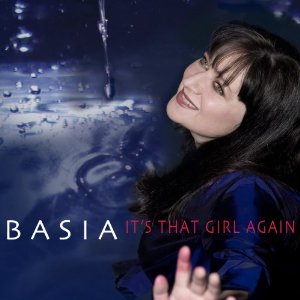 (Koch Records)
(Koch Records)
I remember reading a review when Basia's debut album Time and Tide first came out in 1987, in which the reviewer dismissed the recording out of hand - while doubting that anyone would ever appreciate a Polish-born female singer (with a heavy Polish accent) who sang Brazilian-flavored music. How wrong he was. Time and Tide went on to Platinum sales in the U.S. and vaulted the singer into the superstar category aside singers like Sade and Anita Baker. Basia has been absent for quite some time - releasing only four albums (not counting her work with the reformed Matt Biano or the best of compilation Clear Horizon in 1997) - the last one in 1995. With It's That Girl Again, the reason for the length of time since the last recording is clear - quality is valued over quantity. Basia writes most of her own material with partner Danny White - and the songs on this recording are as strong as anything she's ever done - with slick production and memorable melodies. Kicking off strongly with the Brazilian-infused "If Not Now Then When" - which sounds like it could be a track from Time and Tide, and the upbeat "Someone For Everyone" - Basia is hitting on all cylinders. "I Must" sounds somewhat like vintage Miami Sound Machine, while tracks like the heartfelt "A Gift" and the addictive "Blame on the Summer" are utterly impossible to resist. The former features some delicious and gentle lyrics, while "They Know Nothing About Us" and "Winners" shows her defiant side (perhaps in response to that doubting critic). "Everybody's on the Move" is a catchy dance track, while "There's a Tear" is a lovely ballad. She even sings a song ("Amelki Smiech") in Polish, while "Two Islands" sound as if she has been listening to Brain Wilson of the Beach boys on a truly beautiful number. As she sings on the album ending title track, that girl is indeed back and better than ever.
http://web.mac.com/whitegrainne/Site/Home.html
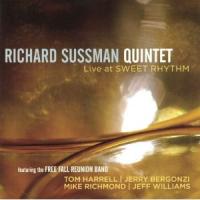 Richard Sussman Quintet - "Live at Sweet Rhythm"
Richard Sussman Quintet - "Live at Sweet Rhythm"
(Origin)
Pianist Sussman was a young player on the NYC loft scene back in the late '70s when he gathered a few of his friends together and made a record. The result was Free Fall, a record that received critical acclaim, but without the financial reward to enable Sussman to keep the band together. The keyboard player ended up teaching at the Manhattan School of Music, writing music for television, work with Hank Jones and even touring with Blood Sweat & Tears and Donna Summer, Meanwhile, over the years Free Fall achieved cult classic status, so when the album was to be re-released on CD in 2003, Sussman decided to try to get all of the original members back together for a reunion gig. With only tenor saxophonist Larry Schnieder unable to make it, original members Tom Harrell on trumpet, Jerry Bergonzi on tenor sax, Mike Richmond on bass and Jeff Williams on drums convened with Sussman for two nights at New York City's Sweet Rhythm nightclub to record an exciting release that features three Free Fall compositions performed live, along with Tadd Dameron's "Soultrane" and the standard "What's New." Of the original band, Harrell has gone on to become of the most acclaimed trumpeters of his generation, while Bergonzi has combined a stellar recording career with one in academia. Richmond and Williams, meanwhile both have continued working worldwide as sidemen. In any case, these fine players sound inspired to be playing together. The band opens with a strong new original from Sussman - "Waiting" - which demonstrates the pianists ability to write songs that showcase the talents of his band mates to the fullest. This hard post bopping tune also showcases Sussman's tasty work on the keys. Bergonzi has been oft compared to Coltrane, and he shows why with his intelligent and fiery playing. Harrell, meanwhile shreds on his trumpet, while Williams adds an explosive drum solo. The jaunty original "Mary's Song" follows and pleases with its joyous sound, while "Soultrane" gives the band a chance to slow it down and get bluesy as Bergonzi channels the great Trane. The colorful uptempo "Tiahuanaco" is a highlight of great writing and playing, while "What's New" has Harrell on fire on some outrageous trumpet forays. "Lady of the Lake" showcases Sussman's compositional skills, and the album ends with the 15:36 "Free Fall" where everyone gets into the act with some free form wailing. Great to hear this exciting group back in action.
http://www.origin-records.com/recordings/recording.php?TitleID=82563
Dave Deason - "From Another Time"
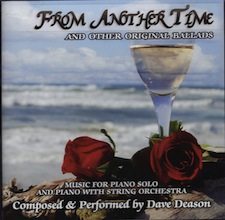 Oregon-based pianist Dave Deason has created a new album of mostly solo piano (with string accompaniment on four pieces) music to sit by the fireplace with your loved one and relax to. Defiant in its nostalgia and romanticism, Deason's all-original compositions are influenced by classical, jazz and new age sources, which creates a compelling mood for love or simply to relax to. Deason was a college music theory professor who has written compositions for orchestras, concert bands, brass, woodwinds and percussion, along with an award-nominated film soundtrack. Although the tracks are melodic and easy to listen to jazz-inspired ones, they offer considerable harmonic depth and enough surprising directions and counterpoint to engage the brain as well as the heart. Some highlights include the haunting "Nocturne," the impressive "Elegy," the title track (an expanded arrangement of a song Deason's soundtrack for the movie From Kilimanjaro With Love), the drifting "Sunset in Venice," "Song for Mary" and "Bossa Chopin," but it's hard to leave out tracks like the bouncy "Where It's Sunny" or the moody "Unaccustomed Glances," and indeed, all of the tracks reveal musical rewards upon repeated listening. A welcome bit of an anachronism in it's outlook in these times, From Another Time is a pleasant temporary escape from the ugliness of modern life that will please fans of jazz and classical piano.
Oregon-based pianist Dave Deason has created a new album of mostly solo piano (with string accompaniment on four pieces) music to sit by the fireplace with your loved one and relax to. Defiant in its nostalgia and romanticism, Deason's all-original compositions are influenced by classical, jazz and new age sources, which creates a compelling mood for love or simply to relax to. Deason was a college music theory professor who has written compositions for orchestras, concert bands, brass, woodwinds and percussion, along with an award-nominated film soundtrack. Although the tracks are melodic and easy to listen to jazz-inspired ones, they offer considerable harmonic depth and enough surprising directions and counterpoint to engage the brain as well as the heart. Some highlights include the haunting "Nocturne," the impressive "Elegy," the title track (an expanded arrangement of a song Deason's soundtrack for the movie From Kilimanjaro With Love), the drifting "Sunset in Venice," "Song for Mary" and "Bossa Chopin," but it's hard to leave out tracks like the bouncy "Where It's Sunny" or the moody "Unaccustomed Glances," and indeed, all of the tracks reveal musical rewards upon repeated listening. A welcome bit of an anachronism in it's outlook in these times, From Another Time is a pleasant temporary escape from the ugliness of modern life that will please fans of jazz and classical piano.
www.davedeason.com/
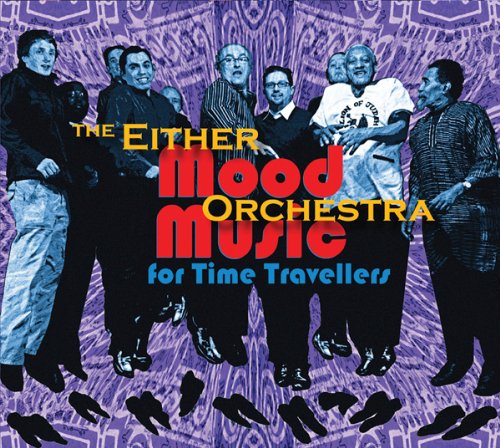 Either/Orchestra - "Mood Music for Time Travelers"
Either/Orchestra - "Mood Music for Time Travelers"
(Accurate Records)
As attendees to their set at the 2010 Chicago Jazz Fest now know, this band, is not merely a lot of fun, but they are pretty damn good players too. Their most recent release, Mood Music for Time Travelers is a case in point. Although perfectly willing to throw out a loopy boogaloo number like the opening "The (One of a Kind) Shimmy," they are equally adept at writing "serious" compositions like "Portrait of Lindsey Schust." Meanwhile, the band thinks nothing of throwing Latin, Tango or Afrobeat into their blender and seeing what tasty concoction comes of it. This long-running, (25-years), Boston-based, multi-cultural large ensemble is led by saxophonist Russ Gershon - who writes most of the compositions - with a pair each added by bassist Rick McLaughlin and trombonist Joel Yennior. Lots of great charts and furious worldbeat rhythms - and I guarantee that you'll find it hard to sit still for "The Petrograd Revision" or the sunny South African calypso of "Suriname." Proof that fun doesn't have to be stupid.
http://either-orchestra.org/
